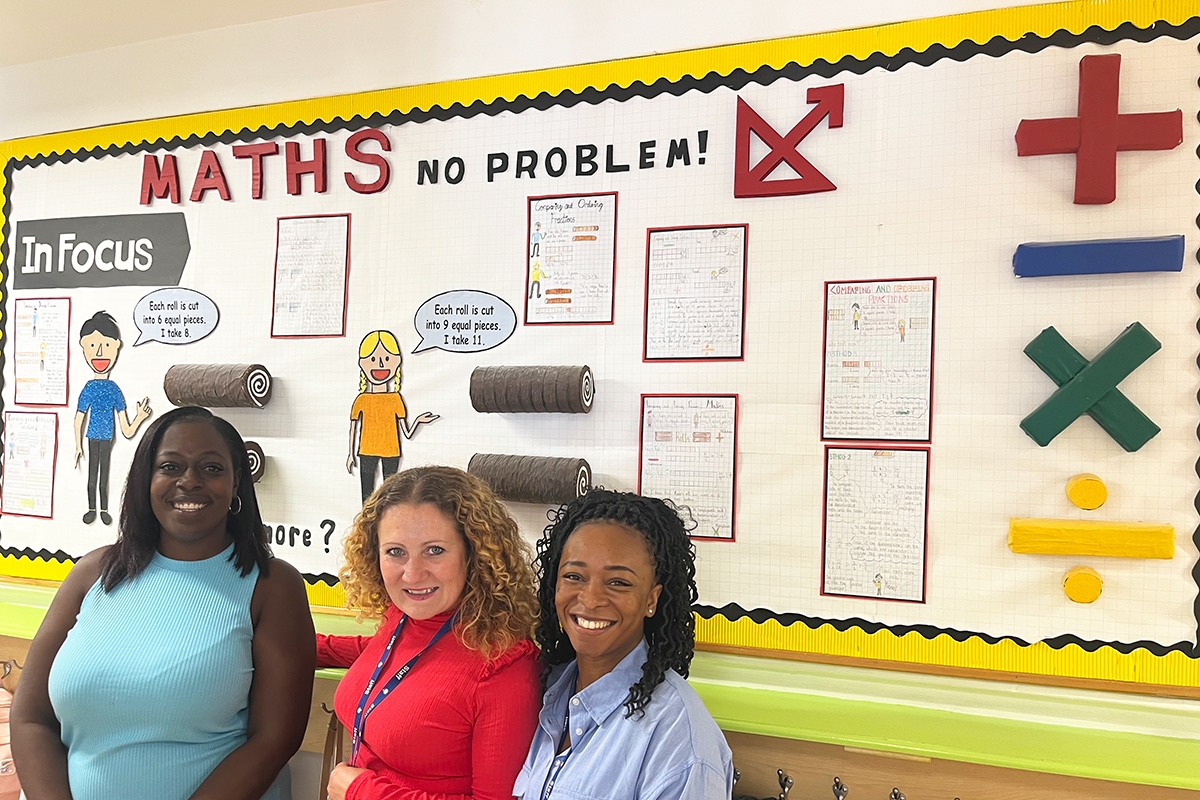Laurice Prempeh at Rosetta Primary on empowering children to learn maths (Part 1)
‘I had to really dig deep and understand the pedagogy and by the time we received the books in about November, I was so excited.’
– Laurice Prempeh, Rosetta Primary
Laurice Prempeh was the year five class teacher at Rosetta Primary in London when her deputy head told her the school would be switching to Maths — No Problem! That was in 2014.
The deputy head had just returned from a journey to Singapore — home of the maths mastery method — and was impressed with the possibilities. But for Laurice, the prospect of changing to a new way of teaching initially caused her some anxiety.
“I was really upset because I thought it would take away our autonomy and I was a bit like, ‘I don't want to use a textbook to tell me how to teach.’ I wasn't really happy with the decision.”
Rosetta began using the Maths — No Problem! Programme across the school, but in those early days, only Year 1 to Year 4 textbooks and workbooks were available. Laurice, who describes herself as “incredibly passionate” about maths, dove deep into the online teacher guides to learn about the programme while she waited for the Year 5 books to arrive a few months later.
Picking apart the pedagogy
“I had to really sort of pick apart the pedagogy and that was a really fantastic experience because I wasn't just given these books to use, like some of my colleagues. I had to really dig deep and understand the pedagogy and by the time we received the books in about November, I was so excited.”
Rosetta Primary, located in the Custom House area of London, is an academy school that caters to around 570 boys and girls aged 4 to 11. It’s part of the Boleyn Trust, a group of schools focused on providing high-quality education. The school is known for its excellent academic progress, especially in mathematics, reading, and writing, placing it in the top 1% of schools in the UK for student progress. It was rated ‘Outstanding’ by Ofsted in 2023.
Laurice says before they started the Maths — No Problem! Programme, her pupils, in particular her more able learners, were used to getting answers right and being given more questions. However, the concept of depth and learning more than one way to do a particular problem, and the use of pictorial images, was an eye-opening experience not only for her but also for her pupils.
“We didn't know very much about the programme. We were told that it was teaching for mastery. We were told that it followed the principles of maths mastery taught in Singapore, but I think just the concept of a textbook — which is the way that I learned maths in secondary school — felt really impersonal. I felt we were going to lose the ability to create and craft our own lessons and make things individualised.”
Diverging views on textbooks
Laurice says teachers in the UK are in two camps when it comes to textbooks. There are those who feel it’s something that will make their job easier — if I have a textbook, I don’t have to think as much, this is all done for me. Then there are others who feel that having to use a textbook means they are less free to plan the lessons they want.

It took Laurice, now assistant headteacher and mathematics subject leader, the entire year to become comfortable with the Maths — No Problem! materials.
“Because I'm quite comfortable with my subject knowledge and I'm quite comfortable with maths in general, I was really eager to understand why it was designed the way that it was, and to really understand the pedagogy. But at that time, I didn't know very much about the coherence and the pattern spotting that was available in the programme. So I felt like I was learning a lot during that first year.”
Laurice has been a maths subject leader for the past seven years, and prior to that had hands-on classroom experience spanning Reception to Year 6.
She recognized the impact on her pupils after the shift to Maths — No Problem! was immediate. One of the big differences she noticed was with the use of manipulatives.
“The insistence that we use manipulatives — it was something that we'd used before, we always had resources in the maths lesson — but the insistence that it was so embedded in the scheme, and they told you how to use them, that was really empowering for all of the children.
Transform Your Maths Assessment
Insights — our online assessment tool — gives you instant, powerful data to identify gaps and improve results.

Shift in mindset
“I think of my lower attainers and they didn't feel set apart from everybody else anymore because everybody was learning in the same way. My middle learners — my National Standard learners — there was that adjustment of ‘Oh I don’t need that resource,’ to see that the resource wasn't to help them to do the maths but to help them see the structures. So it was lovely in the sort of shift in mindset in all of my Learners.”
Looking back, Laurice says there was a big difference in how she taught before, compared with after she started using Maths — No Problem!
“As much as I thought I was really good at my planning, it was a little bit random. Say they were learning to add three digit numbers and my challenge might be ‘okay, we're gonna add four digit numbers.’ I wasn't thinking enough about depth. It was a lot of acceleration.”
Maths — No Problem! gave Laurice a very clear path of the small, incremental steps that are required for knowledge to become deeply embedded, otherwise known as the spiral curriculum, or the spiral approach, a concept attributed to Jerome Bruner.
“I was amazed at how many lessons on fractions, for example, I was doing in Year 5. I was like, ‘why do they need this much?’ But now, it’s so obvious to me.”
She says the combination of her specialist training and her close work with the people at Maths — No Problem! has given her a strong basis to have conversations with her colleagues about the importance of certain elements of the programme, such as coherence and the spiral approach, that weren’t so obvious to her at first.
‘Maths was my fun’
Laurice’s love of maths began at an early age. Her uncle is a maths teacher at a secondary school, and when she was little, he would give her hand-written worksheets to practise on. She says that instilled in her the sense of play with the subject. “Maths was my fun.”
“When I deliver training to teachers I always have to give the caveat that not everybody's going to feel the way that I do about maths. But in my opinion, maths is one of the most real life applicable things, so why not have fun with it?”
She says one of the biggest hurdles she has to overcome is that most people, children and adults alike, become afraid of maths if they don’t immediately understand it.
“You can hear in the children their parents’ voices; the parents don’t enjoy maths and that’s passed on to the children.”
The way to counteract that belief, she says, is to demonstrate that maths is accessible to all children with a programme like Maths — No Problem!
“The small steps and building on knowledge and encouraging depth at the same time shows children and shows teachers that maths is actually accessible.”

Reaching out to parents
As part of the outreach to families, Rosetta holds events called Maths Mysteries, where parents are invited into class and given Explore Tasks to work on with their children. Laurice also delivers Parent Workshops, which are held monthly, often based on subject knowledge or elements of the programme. The goal is to share how maths is taught now because “it's very different to the way our parents learned when they were in school.”
Laurice says she tries to engage with the parents as much as possible, so that when children go home and say they were working on, for example, bar models, the parents have an idea what they’re talking about.
Based on the feedback she has received, Laurice says the outreach has definitely been worth the effort. “The parents who attend always leave on a high. They really enjoy it.”
Implementing across the school
Although she wasn’t part of the decision to roll out Maths — No Problem! across the entire school all at once, Laurice says she now sees the wisdom of the decision.
It was the deputy head who decided to roll it out across the school. “He did acknowledge it would be difficult for us to roll it out everywhere, but he thought the benefits would far outweigh any struggles that we might have with the short implementation. I definitely agree with it now.”
She said sometimes schools don’t roll out the programme in Year 6 because of statutory assessments. They might start in Year 1 and roll it out as they go, which might logistically feel less daunting for a teacher, but the result is that the other children miss out.
“If I imagine my Year 1 children receiving this amazing coherence with these well-crafted lessons, I feel like the other children in the other year groups aren't getting that same deal. And I feel like these carefully crafted lessons are something that all children should have the ability to experience.”
Secondary school maths
Laurice says her son, who learned maths beginning in Year 1 using the Maths — No Problem! Programme, is now in Year 9. He told her when he entered secondary school that learning maths was much different than it had been in primary school.
“He used the word ‘boring,’” she says. “The teacher tells you a formula or gives you a rule, and then you apply it.”
However, research has shown this isn’t an effective way for children to learn. “It’s interesting to me that secondary schools still have that model,” she says, adding that because secondary schools are so assessment-driven, they may feel they need to use this model.
Laurice says with the grounding in maths her son had at home, combined with his early experience with Maths — No Problem! meant that “he completely flew. His ability to discuss mathematical ideas was really strong. I was really happy as a parent to see the way that he could talk about his maths.”
Flourishing hugely
However when he reached Year 7, she noticed his ability to discuss and explain the ideas did drop slightly, and she had to step up to make sure he was still having those conversations about his learning because she knew that wasn’t happening anymore in secondary school.
“I did see him flourish hugely using Maths — No Problem! in primary school.”
Laurice acknowledges that the role of training is “absolutely critical” to her school’s success with the programme. An early training session with the entire staff early in the implementation process was a turning point and allowed her and her colleagues to understand why the deputy head was so excited about the programme.
“It was a moment where we sort of thought, ‘oh, okay, this is what you mean.’”
She says having the training was “so much more impactful; it created huge buy in with us as a staff.”
It also gave them an understanding of the programme and how to deliver it the way it was meant to be delivered.
The ‘critical’ importance of training
Beyond her school duties, Laurice actively participates with the London North East Hub where she works as a primary mastery specialist. In this role she guides schools in East London towards implementing Teaching for Mastery in their settings. She is deeply committed to advancing Teacher CPD, and has successfully designed and delivered a SCITT training program over the past three years.
Laurice says she’s been to other schools where the staff hasn’t had much, if any, training and teachers are just dipping into the programme or they're not aware how to use it. “You don’t know what you don’t know, so I think training is absolutely critical.”

As a maths lead herself, Laurice says she’s been fortunate to be accredited and to have the opportunity through her relationship with Maths — No Problem! to do other training sessions. For example, in June she did a journalling session. She has also done training on fractions and Early Years.
“Me keeping my knowledge up to date means that I can then pass that forward to my staff. I think the training is so beneficial.” She says the Maths — No Problem! offer is “well-designed and very useful.”
That’s why she recommends for schools just starting out with the programme that teachers have an understanding of the different elements. For example, they should know how to manage an Explore Task, how to use the Master well, how the children should feel by the time they get to the Guided Practice in order to complete their Independent Practice.
“Just rolling something out and hoping for the best, you could lose so many brilliant elements” of the programme, she said, adding it’s important to not be afraid and to “really just go for it.”
A partial roll out of the programme means parts of the school are getting a very different education and experience than others, she says. Some children will miss out on the opportunity to progress in maths, and some teachers would miss out on the opportunity to develop professionally.
“As a leader and as a parent, I wouldn’t want that to happen.”

